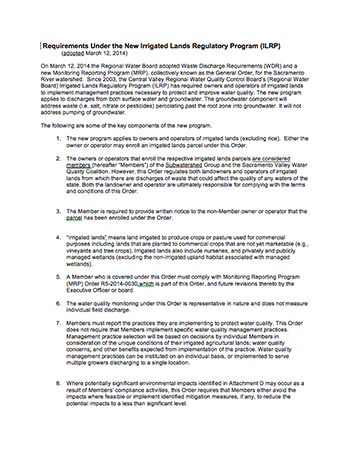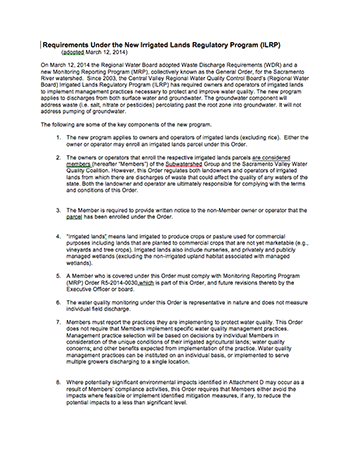The Porter-Cologne Water Quality Control Act (found in California Water Code, Division 7) is very broad in scope. The California Water Code regulates any person discharging waste or proposing to discharge waste within any region that could affect quality of the water of the State. The term “waste” is very broadly defined and the term “waters of the state” includes all surface water and groundwater with the State. The California Water Code applies to point (i.e., sewer line) and non-point (i.e., stormwater running of land) sources.
Persons who discharge waste (dischargers) can be regulated by the Water Board in several ways, including for example, through prohibitions of discharge, waste discharge requirements (a permit) or a waiver of waste discharge requirement (individual or general). If a person discharges waste from irrigated lands to surface waters of the State they need to either file a Report of Waste Discharge (i.e., permit application), cease discharging, or obtain coverage under either an Individual or Coalition Group Conditional Waiver of Waste Discharge. The Central Valley Regional Water Board has adopted regulatory requirements for discharges from irrigated lands (tailwater, water from underground drains, stormwater runoff) to waters of the State under a Conditional Waiver of Waste Discharge Requirements as one method of compliance. The Irrigated Lands Regulatory Program (ILRP) applies to such discharges located within the jurisdiction of the Central Valley Water Board, which extends from the Oregon border south to the northernmost tip of Los Angeles County (Region 5).
The requirements of dischargers regardless of the method of compliance are the same. Dischargers must implement management practices protective of water quality and they must either conduct monitoring or join a Coalition group that is conducting monitoring.
Monitoring and Reporting Program (MRP) requirements are detailed in several Central Valley Water Board actions beginning with Order R5-2006-0053. Coalition Groups must prepare and implement MRP Plan meeting the requirements and submit it to the Regional Board for approval. Specifically the requirements are:
As conditioned by the Conditional Waiver of Waste Discharge Requirements for Discharges from Irrigated Lands (Waiver) Resolution No. R5-2003-0105, Coalition Groups shall develop a monitoring program to assess the sources and impacts of waste in discharges from irrigated lands, and where necessary, to track progress in reducing the amount of waste discharged that affects the quality of the waters of the state and its beneficial uses.
The purpose of this Monitoring and Reporting Program (MRP) is to describe the minimum requirements for an acceptable Coalition Group Monitoring and Reporting Program Plan (MRP Plan). The purpose of the MRP Plan shall be to monitor the discharge of wastes in irrigation return flows and stormwater from irrigated lands that are enrolled under the Waiver. The Coalition Group prepares and submits to the Regional Board for review and approval by the Executive Officer an MRP Plan that meets the minimum requirements of the MRP and includes sites to be monitored, frequency of monitoring, parameters to be monitored, and documentation of monitoring protocols. The Executive Officer will review the MRP Plan to determine if it meets or exceeds the minimum requirements of this Order.
In December 2009, the Water Board Executive Officer Pamela Creedon approved a five-year Coalition specific MRP (below) that focuses surface water quality monitoring and analysis on the pesticides, herbicides, nutrients and other agricultural products specifically used in a Coalition subwatershed.
In 2011 the Central Valley Water Board expanded the Irrigated Lands Regulatory Program to include groundwater quality monitoring and management. The Central Valley Water Board also approved a Short Term (2 year) Renewal of the Coalition Conditional Waiver.
Sacramento River Watershed Waste Discharge Requirements (2014)

